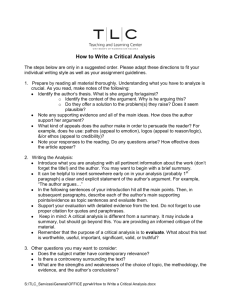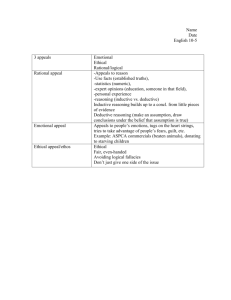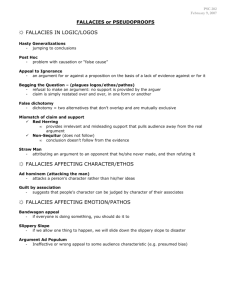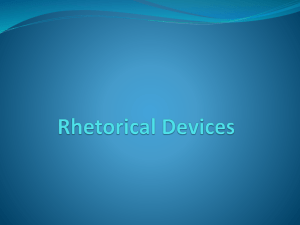Argument Power Point
advertisement
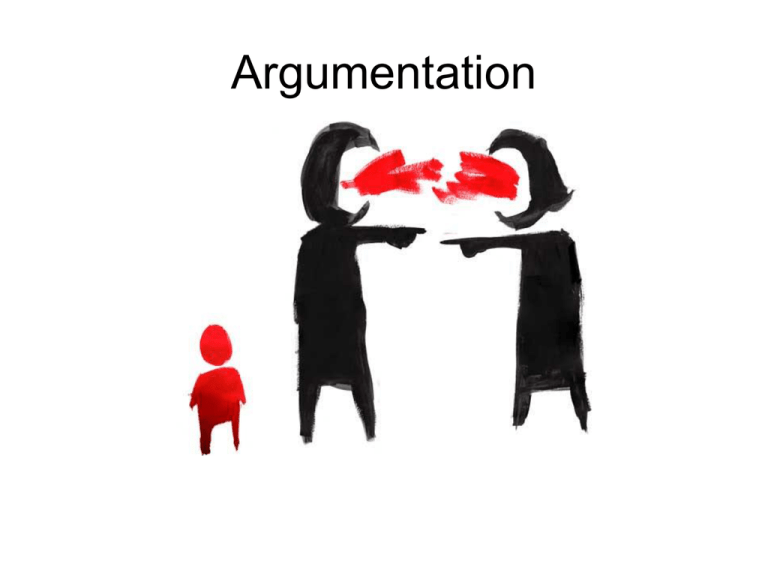
Argumentation What is argumentation? Sure, we all can think of many situations where we have fights with people, but what is argumentation and why does it deserve its own fancy name? Glad you asked… • Argumentation is a reasoned, logical way of convincing an audience of the soundness of a position, belief, or conclusion. Argumentation takes a stand—supported by evidence—and urges people to share the writer’s perspectives and insights. Does this have something to do with those dead Greek guys? Of course!!! The ancient Greeks thought that people who could really let fly a good argument were the rock stars of their age. Follow the rules!!! Aristotle and other ancient Greeks designed a series of rules for public speaking (that also apply to writing) to ensure that ideas are presented fairly and logically. Argument vs. Persuasion Although the two terms are often used interchangeably in everyday speech, they are not equivalent. Hey, wouldn’t it be fun to guess the difference between them?!!! Persuasion Persuasion is a general term that refers to how a writer moves an audience to adopt a belief or follow a course of action. To persuade an audience, a writer relies on various appeals – to the emotions, to reasons, or to ethics. Sorry…off topic… Argument Argument is the appeal to reason (and only uses this appeal) A writer does not try to move an audience to direct action, but rather to demonstrate that ideas are valid. Argument also has a formal structure. Types of Appeals Logos: appeal to logic Pathos: Appeal to Emotion Ethos: Ethical Appeal Ethos is the ethical standing of the speaker or writer. It is often confused with making an ethical argument in general. Ethos? Pathos? Logos? Going Beyond Ethos, Pathos, Logos: Modern Appeals These appeals are ranked from the MOST ethical to the LEAST ethical ways of making an argument. 1. Reason: Facts, Figures, Evidence #2 Altruism Appeal to our better selves. #3 Common Sense What we know… “We all know that times are hard these days…” “We all know that you can’t teach an old dog new tricks…” #4 Patriotism Appeal to common base of knowledge and values. #5 Common Experience “We all have had times when things have not gone as planned…” “Who hasn’t felt the excitement of rooting for the winning team and the despair of being on the losing side?” Warning: These next appeals can be downright unethical! #6: Appeal to Authority (“Because I said so…because God says…”) #7 Self-Interest “Elect me because I will lower your taxes.” “No immigration – we need all the jobs for ourselves!” Emotions (type of emotion = how ethical the appeal will be) Love, honor… Hate, fear… Prejudice You should not make an argument based on this appeal! What type of appeal to choose? The type of appeal depends on whether your audience is friendly, neutral, or hostile to your proposal. Here are some ways to get your audience on your side… EMPATHY! First person plural: “We…” Common Group: “My fellow…” Another way to get audience on your side: COMPLIMENTS “this distinguished audience…” Yet another way to get audience on your side: URGENCY “…in this time of crisis…” Audience still not on your side? Try… APPEAL TO COMMON SUFFERING “I feel your pain…” One last… DESIRE TO HELP “I just want you to be happy…” Types of Evidence FACT Statements most people agree are true and can be verified independently. E.g., statistics. Most important type of evidence. Types of Evidence: Opinions Interpretation of facts. Opinions of experts more convincing than the opinions of inexperienced people Evidence Should Be: • • • Relevant. Representative: full range of opinions on a subject and not just one side or the other. Sufficient. (skeptical audience needs more evidence!) Deal with the Oppostion Refute the arguments against your position. State the objections to your case and explain why your own arguments are sound. Make your point using: Deductive or Inductive Logic More on this later!!! Also, watch out for logical fallacies When your argument just doesn’t make sense! You will learn the names for the different types of logical fallacies soon… Did you learn a lot? Here’s your payment…. Just kidding…what I meant to say is that you no doubt are enriched by new knowledge!
